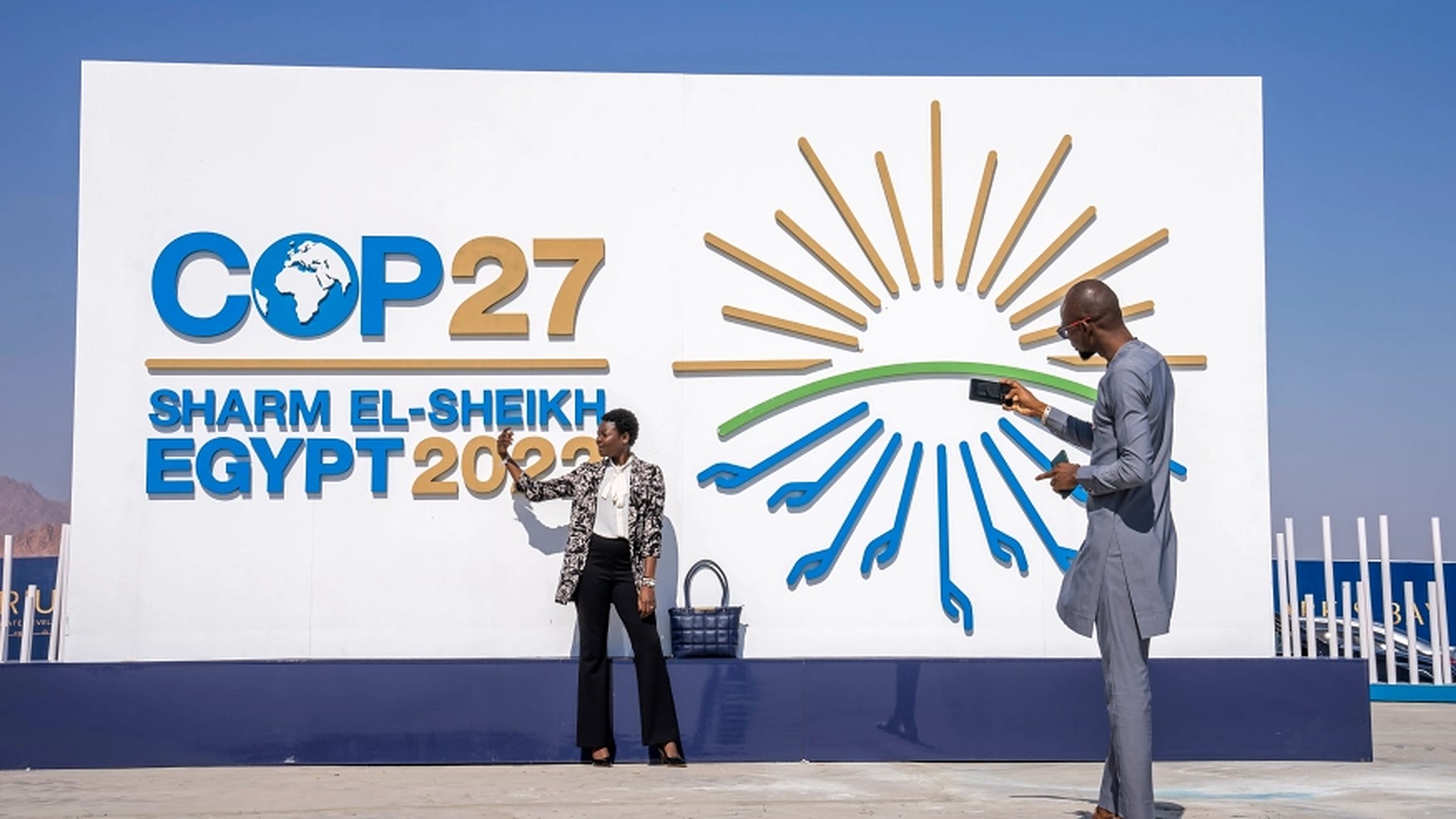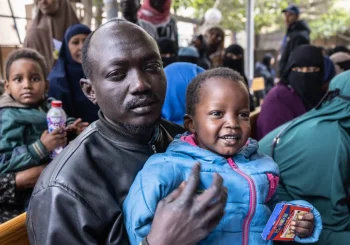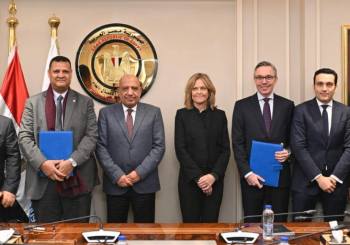Though it has only been a week, the 2022 United Nations Climate Change Conference (COP27) has already helped to raise the global climate finance target to USD 300 billion a year from USD 100 billion. The global climate finance target is a commitment by developed countries to jointly mobilize USD 100 billion per year by 2020 in support of developing countries, as part of the Paris Agreement.
A number of initiatives have been announced to mobilize climate financing and ensure that commitments are translated into implementable projects, moving in line with the theme of this year’s conference: “together for implementation”.
As COP27 is taking place in Egypt, it brings special focus to the plight of developing nations, particularly in Africa. For the first time, the conference began with the concept of “loss and damage” financing formally on the agenda, which means that countries most responsible for past greenhouse gas emissions — the United States, China, and Western Europe — will need to provide adequate financing for climate-related damages occurring in developing countries.
Below are some of the most important initiatives.
The Sharm El-Sheikh Adaptation Agenda
The Sharm El-Sheikh Adaptation Agenda is arguably one of the most important initiatives announced at COP27, as it seeks to mobilize USD 140 billion to USD 300 billion across both public and private sources (government and private institutions) annually to pursue these goals, raising the global finance target.
To map out where the funds should be deployed, the initiative outlines 30 adaptation outcomes that it says must be reached by 2030 to protect four billion people living in the most vulnerable communities in Africa, and suffering from climate disasters such as extreme heat, drought, and floods.
These outcomes represent the first global plan that brings together state and non-state actors to collectively achieve a set of adaptation outcomes across several sectors, namely food and agriculture, water and nature, coasts and oceans, as well as human settlements and infrastructure.
The agenda particularly focuses on agriculture and food security, as it calls for transitioning to sustainable climate-resistant agriculture systems that can increase yields by 17 percent, while at the same time reduce greenhouse gas emissions from farms by 21 percent. Another outcome target is to provide smart, improved early warning systems to protect three billion people from climate emergencies like storms, floods, and heat waves.
As mangrove forests act as buffers against storm surges, another important agenda goal calls for investing USD 4 billion to protect 15 million hectares of mangroves. The agenda also includes plans to expand access to clean cooking fuels and putting an end to commodity-driven deforestation.
African Carbon Markets Initiative
The new Africa Carbon Markets Initiative (ACMI) aims to contribute to the growth of the carbon credit production in Africa. According to the Carbon Fund, a carbon credit represents ownership of one metric tonne of carbon dioxide by a company or an individual that can be traded, sold or retired. This way, if a business wishes to keep its carbon emissions low, it will have the benefit of allocating, trading, or selling a carbon credit.
The ACMI announced bold ambitions to reach 300 million credits produced annually by 2030, which would unlock USD 6 billion in income and support 30 million jobs. By 2050, the ACMI is targeting over 1.5 billion credits produced annually in Africa, which supports over 110 million jobs.
The ACMI is also collaborating with major carbon credit buyers and financiers, such as Exchange Trading Group, Nando’s, and Standard Chartered, to create a market commitment to hundreds of millions of dollars for African carbon credits and encourage other carbon credit buyers to collaborate and join a consortium with other financiers.
The Middle East Green Initiative
The Middle East Green Initiative, launched by Saudi Arabia’s Crown Prince Mohammed bin Salman, facilitates the first-of-its-kind regional dialogue on climate, with leaders from 28 countries dedicated to tackle climate change in the Middle East region.
The initiative puts forward many ambitious targets, aiming to reduce carbon emissions from regional hydrocarbon production by more than 60 percent, plant 50 billion trees across the Middle East and restore an area equivalent to 200 million hectares of degraded land, as well as establish several centers and programs that will help the region coordinate and deliver the targets of the Middle East Green initiatives.
These centers will create the infrastructure and knowledge exchange necessary to attract investment on the circular carbon economy and afforestation.
The International Drought Resilience Alliance
At the initiative of President of Senegal, Macky Sall, and the Spanish Prime Minister, Pedro Sánchez, leaders from over 25 countries and 20 organizations launched the International Drought Resilience Alliance to accelerate action for future droughts.
According to the latest Drought in Numbers report, droughts have increased in frequency by 29 percent since 2000, with some 55 million people affected every year. The Intergovernmental Panel on Climate Change (IPCC) also estimates that three out of every four people in the world will be living in drier, more water-scare conditions by 2050.
The alliance brings forward new financial commitments, including a EUR five million seed fund announced by Spain to support the work of the alliance and catalyze a process to mobilize more resources for this agenda. President of Kenya, William Ruto, also announced a commitment to plant 5 billion trees in the next 5 years, and 10 billion trees in 10 years.
To make drought resilience a priority in national development and cooperation, the alliance aims to promote the consolidation of regional initiatives to fast-track sharing of innovation, technology transfer, and mobilization of resources.
The Bridgetown Initiative
One of the most ambitious initiatives, which earned the support of French President Emmanuel Macron and US Climate Envoy John Kerry, is the Bridgetown Initiative led by Barbadian Prime Minister and climate advocate Mia Mottley. Mottley has been nicknamed the “Caribbean queen of COP27” due to her bold efforts to push for reforms in financial systems such as the World Bank and the International Monetary Fund, and force them to increase financing with lower interest rates.
The Bridgetown Agenda calls for development banks to issue USD one trillion in low-interest loans for climate spending in developing countries. It also calls for a tax on oil companies to finance reconstruction grants for developing countries after climate disasters. The money raised from taxing oil companies’ profits would be classified as loss and damage funding, as well as climate mitigation and adaptation.
Green Jobs for Youth Pact
Though there are many initiatives that focus on infrastructure and financing, the Green Jobs for Youth Pact initiative by the International Labor Organization (ILO) and other UN agencies, highlights the opportunities of green jobs and how climate action can not only protect the planet, but also improve the livelihoods of people.
The Youth Pact aims to close the skill gap for young people in developing countries and target climate vulnerable sectors, creating one million green jobs, supporting the greening of one million existing jobs, and helping 10,000 green entrepreneurs.
Green jobs are jobs that contribute to reducing carbon emissions, restoring nature or protecting the environment. They can be in a range of industries, such as manufacturing and construction, or in new, emerging green sectors such as renewable energy and energy efficiency. At the enterprise level, they can also include goods and services that help in preserving the environment, such as recycling materials.
The initiative also aims to provide financial institutions with practical advice to relevant resources on how to embed a just and human-centered transition lens into their operations, in alignment with the Paris Agreement.







Comments (3)
[…] and advancements in multiple fields, including the launch of several wide-scale projects, initiatives, and curated […]
[…] With more than 40,000 attendees from nearly 190 countries, and over 120 heads of state, both the Blue Zone, as managed by the UN, and the Green Zone, managed by Egyptian authorities, saw diverse contributions and the inauguration of several climate action initiatives. […]